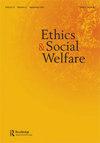Existential Well-being among Young People Leaving Care: Self-feeling, Self-realisation, and Belonging
IF 0.9
Q4 SOCIAL WORK
引用次数: 0
Abstract
ABSTRACT This study explores young people’s perceptions of their existential well-being during the transition after leaving care. We use the theoretical framework of ‘existential well-being,’ which is a relational approach. The study deploys participatory action research methodology and involves peer research with 74 young people leaving care aged 17–32 in Finland (2011–2012) and England (2016–2018). The data was gathered through semi-structured interviews and thematically analysed. We identified three inter-linking categories of existential well-being related to the basic issues of being a person: who one is and where one belongs. Self-feeling involves the importance of how one feels about oneself and one’s physical and mental health and security. Self-realisation relates to one’s hopes and the means for making one’s own decisions in everyday life. Belonging concerns the confidence one expresses in one’s supportive social networks. The findings highlight that, alongside the practical issues of out-of-home care, attention should increasingly focus on young people's reflections on their own lives, and an ethics of care should be developed to better meet their needs. These findings argue for the need to further support young people’s psychosocial and mental health in child welfare policy and practice.离开护理机构的年轻人的生存幸福感:自我感觉、自我实现和归属感
摘要本研究旨在探讨青少年在离开照护后的过渡期对自身存在幸福感的认知。我们使用“存在幸福”的理论框架,这是一种关系方法。该研究采用参与式行动研究方法,对芬兰(2011-2012年)和英国(2016-2018年)74名17-32岁的年轻人进行同伴研究。数据是通过半结构化访谈收集的,并进行了主题分析。我们确定了存在幸福的三个相互关联的类别,这些类别与作为一个人的基本问题有关:一个人是谁,一个人属于哪里。自我感觉涉及到一个人对自己的感觉以及一个人的身心健康和安全的重要性。自我实现与一个人的希望和在日常生活中做出自己决定的手段有关。归属感涉及一个人在支持性社会网络中表达的信心。研究结果强调,除了家庭外护理的实际问题外,应越来越多地关注年轻人对自己生活的反思,并应培养一种护理伦理,以更好地满足他们的需求。这些发现表明,需要在儿童福利政策和实践中进一步支持青少年的社会心理和精神健康。
本文章由计算机程序翻译,如有差异,请以英文原文为准。
求助全文
约1分钟内获得全文
求助全文
来源期刊

Ethics and Social Welfare
SOCIAL WORK-
CiteScore
1.60
自引率
20.00%
发文量
36
期刊介绍:
Ethics and Social Welfare publishes articles of a critical and reflective nature concerned with the ethical issues surrounding social welfare practice and policy. It has a particular focus on social work (including practice with individuals, families and small groups), social care, youth and community work and related professions. The aim of the journal is to encourage dialogue and debate across social, intercultural and international boundaries on the serious ethical issues relating to professional interventions into social life. Through this we hope to contribute towards deepening understandings and further ethical practice in the field of social welfare. The journal welcomes material in a variety of formats, including high quality peer-reviewed academic papers, reflections, debates and commentaries on policy and practice, book reviews and review articles. We actively encourage a diverse range of contributions from academic and field practitioners, voluntary workers, service users, carers and people bringing the perspectives of oppressed groups. Contributions might include reports on research studies on the influence of values and ethics in social welfare practice, education and organisational structures, theoretical papers discussing the evolution of social welfare values and ethics, linked to contemporary philosophical, social and ethical thought, accounts of ethical issues, problems and dilemmas in practice, and reflections on the ethics and values of policy and organisational development. The journal aims for the highest standards in its published material. All material submitted to the journal is subject to a process of assessment and evaluation through the Editors and through peer review.
 求助内容:
求助内容: 应助结果提醒方式:
应助结果提醒方式:


